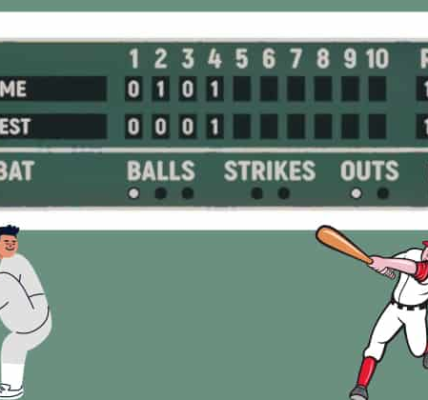A rain delay in baseball occurs when inclement weather, such as heavy rain or thunderstorms, forces a temporary pause in the game. This interruption aims to ensure player safety and prevent injuries caused by slippery field conditions. During a rain delay, both teams are directed to their dugouts, and a protective tarp is placed over the infield area.
Determining Rain Delays
Umpires play a crucial role in deciding when a rain delay should be initiated. According to baseball rules, umpires must wait for a minimum of 75 minutes before declaring a rainout or deciding to resume the game. The delay continues until the weather improves, ensuring safe playing conditions for the athletes.
Causes of Baseball Rain Delays
While heavy rain is a primary cause of rain delays, other weather conditions can also contribute to game interruptions. Lightning, extreme fog, hail, and snow are factors that can make the playing field unsafe. In some instances, unexpected events like a swarm of bees can lead to a temporary stoppage.
Rain Delays Before Games
Rain delays are not limited to ongoing games; they can occur even before a game officially begins. Home team managers have the authority to decide on delays or cancellations due to inclement weather before the game starts. Timely decisions are essential to allow players to adjust their pre-game routines.
The Longest Rain Delay in Baseball History
The record for the longest rain delay in baseball history stands at an astounding 7 hours and 23 minutes. This historic delay took place at Comiskey Park in Chicago on August 12, 1990, during a game between the White Sox and the Texas Rangers.
Baseball Rain Delay Rules
In 2020, baseball implemented rule modifications regarding rain delays. Rain-suspended games were eliminated, and a new rule stated that if a game hadn’t reached the fifth inning, umpires could declare it suspended. Completed fifth-inning games are considered official, with the team leading at the time of the delay declared the winner.
Decode the intricacies of baseball ties – unraveling the mysteries of unresolved matches.
Home Team Influence on Rain Delays
Home team managers hold decision-making power regarding rain delays or cancellations before a game starts. However, once the lineup card is submitted to the umpire crew chief, the responsibility shifts to the umpires to determine if a delay or cancellation is necessary.
Reasons for Avoiding Rainy Conditions in Baseball
Player safety is paramount in baseball, and playing in the rain poses several risks. Slippery and muddy field conditions increase the likelihood of injuries. Pitchers may struggle to grip wet baseballs, impacting the overall safety and integrity of the game.
Rain Delay vs. Rainout
Distinguishing between a rain delay and a rainout is crucial. A rain delay is a temporary pause in the game, often with the expectation of improving weather conditions. In contrast, a rainout is equivalent to a canceled game, occurring when field conditions remain unsafe even after a delay.
Adapting to Change: Innovations in Rain Delay Management
As baseball continues to grapple with the challenge of rain delays, technological advancements have emerged as game-changers. Teams now rely on state-of-the-art weather prediction systems to anticipate adverse conditions well in advance. These systems provide real-time data, enabling decision-makers to plan proactively and reduce the impact of weather-related interruptions.
The Role of Retractable Roof Stadiums
While retractable roof stadiums aim to eliminate rain delays, occasional unforeseen circumstances test the resilience of these structures. Engineers constantly refine designs to enhance functionality and minimize potential disruptions.
Modern retractable roofs not only shield the playing field but also prioritize fan comfort, ensuring an uninterrupted viewing experience despite external weather conditions.
Fan Engagement during Rain Delays
Recognizing the impact of rain delays on fan experience, teams are exploring innovative ways to engage audiences during interruptions. Social media platforms, interactive apps, and behind-the-scenes content keep fans connected and entertained.
Some teams even organize impromptu events or giveaways to turn rain delays into unique, memorable experiences for attendees.
Environmental Considerations and Sustainable Practices
As environmental awareness grows, baseball organizations are incorporating sustainable practices in rain delay management. Water drainage systems, eco-friendly field coverings, and energy-efficient stadium designs contribute to minimizing the ecological footprint of rain delay preparations.
Embracing green initiatives aligns with the broader movement toward eco-conscious sports facilities.
International Perspectives on Weather Challenges
Beyond the United States, baseball faces diverse weather challenges in international leagues. For instance, in Japan, typhoons and heavy rains pose unique threats to the game.
Leagues worldwide exchange insights and strategies to address region-specific weather issues, fostering a global collaboration to enhance the resilience of baseball against nature’s unpredictability.
Find out more in this video
Balancing Tradition and Innovation
While embracing technology and innovations, baseball remains rooted in tradition. The essence of the game lies in its adaptability to various challenges, including weather interruptions.
Groundskeepers, equipped with modern tools and techniques, work alongside age-old practices to ensure the playing surface maintains its integrity during and after rain delays.
Looking Ahead
As baseball navigates the ever-changing landscape of weather-related challenges, the commitment to continuous improvement remains steadfast. From adapting playing surfaces to exploring advanced meteorological tools, the sport evolves to provide both players and fans with a seamless and enjoyable experience, regardless of external conditions.
Conclusion
Rain delays weave a unique narrative of adaptation and resilience. Whether through cutting-edge technologies, eco-friendly practices, or international collaborations, the sport confronts the challenges posed by nature with determination.
The unpredictability of rain delays adds an element of suspense to the game, reminding us that, in the end, baseball is not just a sport played on the field but an ever-evolving saga influenced by the elements and human ingenuity.




